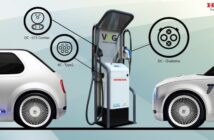Everyone knows the numerous benefits to electric cars, zero emissions, mainly because of their excellent record for saving gas. However, what some people don’t know is that the new technology in electric cars is helping them reach blazing speeds that rival the performance of a Porsche or BMW, and compete on some racecourses with some of the world’s most popular gasoline-powered cars.
Speaking at the 246th National Meeting & Exposition of the American Chemical Society (ACS), last year, electric vehicle pioneer John E. Waters said that relatively recent advances in engineering and use of lithium-ion batteries are producing electric vehicles (EVs) capable of leaving traditional internal combustion engine race cars in their dust.
“Experimental electric cars already have achieved sustained speeds of more than 180 miles per hour, and established world speed records above 300 mph,” Waters said. “Electric cars have inherent advantages in efficiency and torque over gasoline-powered vehicles. Energy storage-to-torque on an EV platform is above 90 percent efficient, compared to less than 35 percent for internal combustion engines. I have no doubt that battery-powered race cars will be attracting race fans in the immediate future.”
Waters points out that race cars and racetracks do more than thrill an estimated 90 million motorsport fans in the United States alone. Additionally, they have served historically as test beds for new automotive technology. The place where top-notch performance fosters wider public acceptance of the technology to be found eventually in consumer cars.
That is proving true as EVs attain breathtaking speeds, puncturing myths about (slow) EV performance. In the early 1990s, Waters helped develop the battery pack system for General Motors’ electric car, the EV1; helped set an EV world speed record at 183 mph; later founded Bright Automotive, a company that invented a 100-mpg plug-in hybrid electric commercial vehicle; and now heads Waters and Associates, LLC, a consulting firm specializing in global sustainable mobility and housing.
Electric race cars have such a great capacity for speed because they utilize energy more efficiently than internal combustion engines, Waters explains. Turning gasoline into motion involves multiple steps that transfer motion from pistons to a crankshaft, then to a flywheel, through a transmission and other mechanisms to finally reach the wheels.
Each step consumes energy before it can become applied as motion, or torque, to the wheels. In contrast, with an EV, the conversion is more direct, from batteries to an electric motor that operates with negligible friction (electric motors still goes through a simplified gearbox and other mechanisms to the wheels).
EV motors often provide up to 15,000 revolutions per minute (RPM), compared to less than 8,000 RPM for internal combustion engines (consumer cars usually provide less than 6,000). The high RPM of the electric motor eliminates the need for heavy and expensive transmissions.
Waters adds, the bottom line is that EVs have “instant torque,” (the twisting motion that turns the wheels), that has enabled test cars to go from 0 to 60 mph in less than 4 seconds. Waters said, “It’s hard to believe unless you experience it. Every Tesla owner knows what I am talking about.”
At UPS Battery Center, our goal isn’t to only sell batteries, we want to inform and teach you about the amazing world of batteries, electricity and energy. Please check back for more interesting, helpful and informative articles about batteries and electricity.
Related Articles:
Structural Batteries To Lighten Electric Vehicles
Hybrid and Electric Vehicle’s Batteries
Next-Gen Electric Vehicles May Be Powered by a Battery That Breathes




